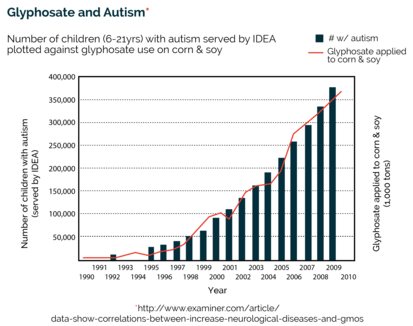Great Plains Laboratory Glyphosate Test
Glyphosate disrupts your gut microbiome and could be causing your health issues.
Glyphosate is the world’s most widely produced herbicide. It is a broad-spectrum herbicide that is used in more than 700 different products, from agriculture and forestry to home use.
Glyphosate was introduced in the 1970s to kill weeds by targeting the enzymes that produce the amino acids tyrosine, tryptophan, and phenylalanine. After the introduction of genetically modified (GMO) crops, the usage of glyphosate exploded, and it can now be found worldwide in:
- Soil
- Rain water and waterways
- Food made with treated crops
- Meat and dairy from livestock that were fed treated crops
Other high correlations include hypertension, stroke, diabetes, obesity, lipoprotein metabolism disorder, Alzheimer’s, senile dementia, Parkinson’s, multiple sclerosis, inflammatory bowel disease, intestinal infections like SIBO (small intestine bacteria overgrowth), leaky gut and may contribute to other intestinal disorders such as Colitis and Crohn’s, along with end stage renal disease, acute kidney failure, cancers of the thyroid, liver, bladder, colon, pancreas, kidney, and myeloid leukemia.

Two Tests Available: Urine Test and Water Test

Purchase your Glyphosate Test and we will send you a kit to retrieve samples.

Send your urine or water sample to the lab and receive results in a few weeks.

Schedule a phone consultation with me to evaluate your test results and discuss recommendations.
No posts found!
No posts found!
- Determine the source of exposure
- Avoid future exposure (eating non-GMO foods and drinking reverse osmosis water can help you avoid glyphosate.)
- Devise treatments to remove the toxins from the body
- Support specific gut functions using nourishing dietary practices, supplement protocols, and lifestyle recommendations
An imbalance in your digestive system can create imbalance throughout your body and mind.
Recent studies have discovered glyphosate exposure to be a cause of many chronic health problems. The World Health Organization International Agency for Research on Cancer published a summary in March 2015 that classified glyphosate as a probable carcinogen in humans.
Possible cancers linked to glyphosate exposure include non-Hodgkin lymphoma, renal tubule carcinoma, pancreatic islet-cell adenoma, and skin tumors. Studies have also indicated that glyphosate disrupts the microbiome in the intestine, causing a decrease in the ratio of beneficial to harmful bacteria.
The relationship between the microbiome of the intestine and overall human health is still unclear, but current research indicates that disruption of the microbiome could cause diseases such as digestive disorders, metabolic disorder, diabetes, depression, autism, cardiovascular disease, and autoimmune disease.





